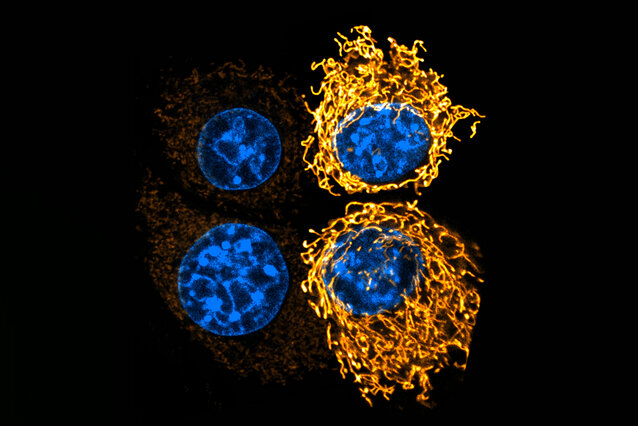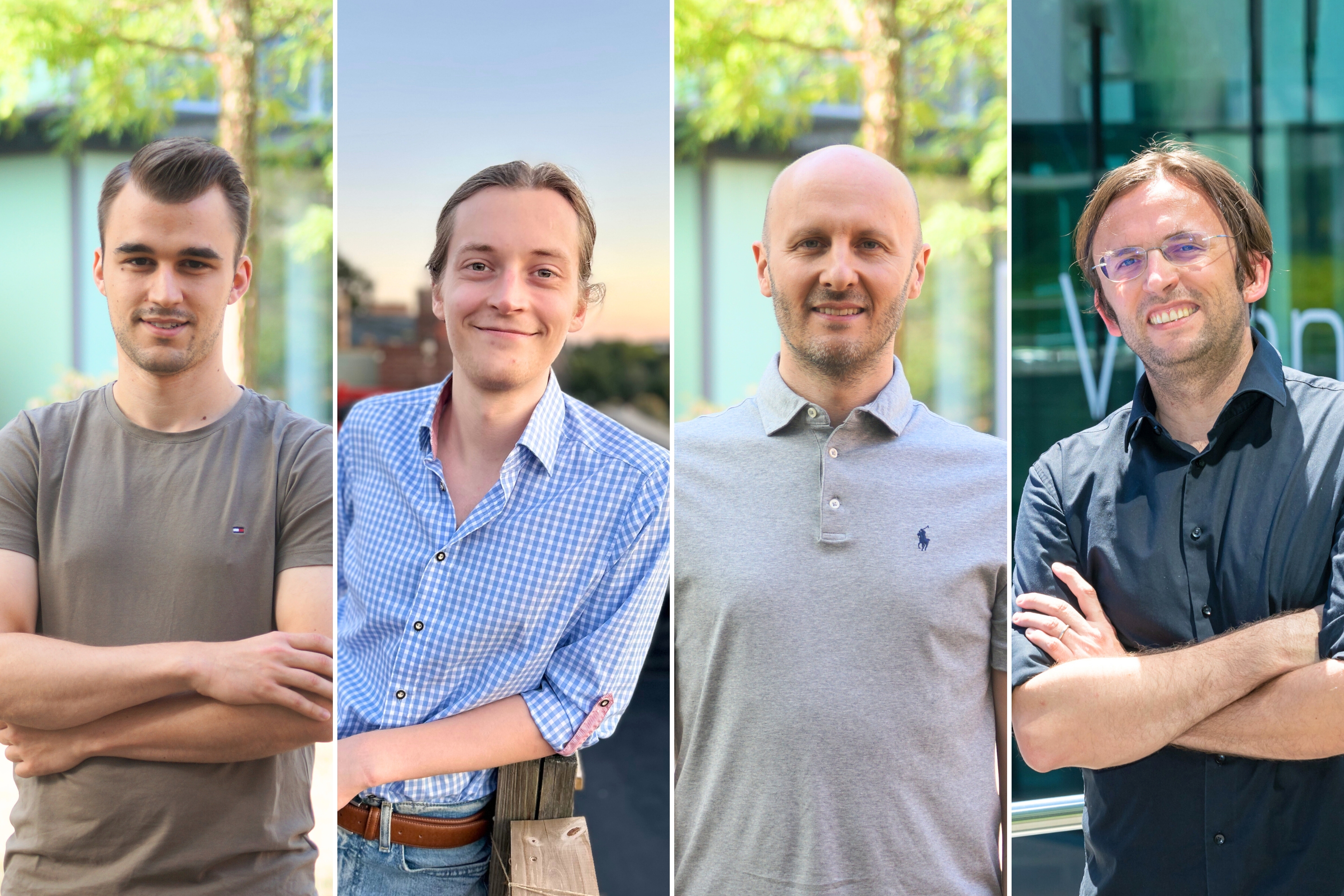How cancer turns sour into power

Cancer cells grow in hostile environments where nutrients are scarce and waste accumulates. An international team of scientists has now shown that acidosis—the acidic conditions inside tumours—acts as a master switch that reprograms cancer cell metabolism. Using genetic screens, they discovered how acidosis drives mitochondrial fusion and energy production, making tumour cells more resilient. The findings are published in the journal Science.
Cancer cells are masters of survival. Inside a tumour, they face a hostile environment where nutrients are scarce, oxygen is limited, and waste products accumulate—conditions that would kill most healthy cells. Cancer cells manage to keep growing by reprogramming their metabolism and drawing energy from virtually any resource at hand. This adaptability comes from their ability to switch energy sources and cellular processes on demand, a flexibility that allows them to survive stresses that would cripple ordinary cells.
While researchers have long studied how cancer cells adapt to individual stresses like low oxygen or nutrient starvation, tumours don’t present challenges one at a time. In reality, cancer cells are hit by multiple stressors simultaneously, and it has been unclear how they adjust to such complex challenges.
To tackle this question, two groups of scientists teamed up: Wilhelm Palm of the German Cancer Research Center (DKFZ) in Heidelberg, a distinguished expert in cancer metabolism, and Johannes Zuber, a leading scientist in functional cancer genetics at the IMP. Together, the researchers applied an innovative genetic screening approach to perform the first systematic analysis of metabolic adaptations in tumours.
The team discovered that acidosis—a drop in pH caused by the buildup of metabolic byproducts in tumours—acts as a master switch that overrides other stress responses. The scientists found that acidosis triggers the fusion of mitochondria—the cell’s power plants–leading to a boost in energy production. Under acidosis, cancer cells switch from a sugar-burning to a much more efficient, oxygen-based mode of energy production that makes them fit for various types of stresses.

One stressor to rule them all
To find the drivers of cancer metabolism, the researchers used CRISPR-Cas9, the “gene scissors”, to switch off nearly every gene in the genome and identify the ones cancer cells rely on under stress. “We first ran genome-wide screens in cell culture to identify all the genes that change how cancer cells cope with different stresses,” explains Robert Kalis, co-first author and former student in the Vienna BioCenter PhD program. “Then we combined these ‘fitness genes’ in a focused screen to study their function directly in pancreatic tumours.”
By comparing the pattern of fitness genes between tumours and different culture conditions, the scientists could also learn about the importance of different stresses. Surprisingly, they discovered one stress condition that dominated over all others:
the acidic environment inside tumours. No matter which stresses they combined it with—glucose starvation, amino acid shortage, or even growth factor deprivation—acidosis consistently overruled the others. “It pushed cancer cells to abandon their reliance on sugar-burning pathways and instead fully rely on mitochondria, the cell’s power plants,” explains Sven Groessl, co-first author from Wilhelm Palm’s lab at the German Cancer Research Center (DKFZ).“And this fundamental switch in energy metabolism makes cancer cells resilient to many other stresses.”
With further experiments, the team discovered how acidosis achieves this dominance. One of the most important drivers of cancer is the ERK signalling pathway, which regulates vital cell functions such as growth, division, differentiation, and responses to stress. Under normal conditions, this pathway pushes mitochondria to fragment. But in acidic environments, ERK activity was dampened, and mitochondria instead fused into elongated networks, boosting their capacity to produce energy from diverse fuels. This fusion was not just a structural change but a lifeline: without it, cancer cells could not survive in acidic tumours. The team also observed similar effects in lung cancer models, suggesting that this mechanism may extend beyond pancreatic tumours.
Further, blocking mitochondrial fusion in mice stripped cancer cells of their metabolic flexibility and stalled tumour growth, pointing to a potential therapeutic vulnerability.
“What’s exciting about this study is how it changes the way we think about tumour metabolism,” says Wilhelm Palm, co-corresponding author. “Acidosis is not just a byproduct of altered metabolism in tumours. It’s a dominant factor that shapes energy metabolism in cancer cells and makes them resilient to different types of stress”.
“This discovery is highly relevant for our search for more effective cancer therapies,” adds co-corresponding author Johannes Zuber. “Acidosis equips cancer cells with metabolic superpowers that help them survive not only harsh conditions but also treatment stress. With that knowledge, we can now search for therapies under these more realistic conditions and explore new ways to break this resilience”.
Original Publication
Sven Groessl*, Robert Kalis*, Marteinn T. Snaebjornsson, Leon Wambach, Jakob Haider, Florian Andersch, Almut Schulze, Wilhelm Palm#, and Johannes Zuber#. “Acidosis orchestrates adaptations of energy metabolism in tumors.” Science, DOI: 10.1126/science.adp7603
*These authors contributed equally. #Corresponding authors.
About the IMP at the Vienna BioCenter
The Research Institute of Molecular Pathology (IMP) in Vienna is a basic life science research institute largely sponsored by Boehringer Ingelheim. With over 220 scientists from 40 countries, the IMP is committed to scientific discovery of fundamental molecular and cellular mechanisms underlying complex biological phenomena. The IMP is part of the Vienna BioCenter, one of Europe’s most dynamic life science hubs with 2,800 people from over 80 countries in six research institutions, two universities, and 35 biotech companies. www.imp.ac.at, www.viennabiocenter.org